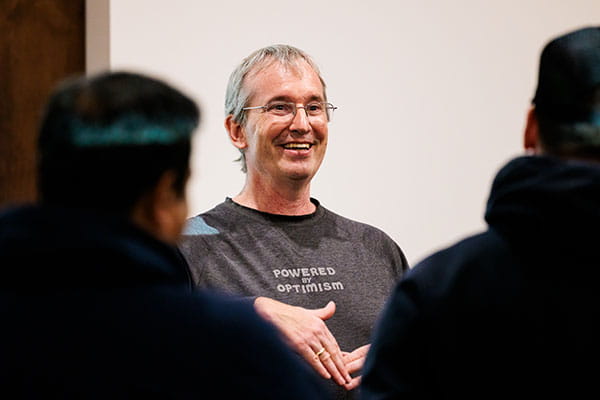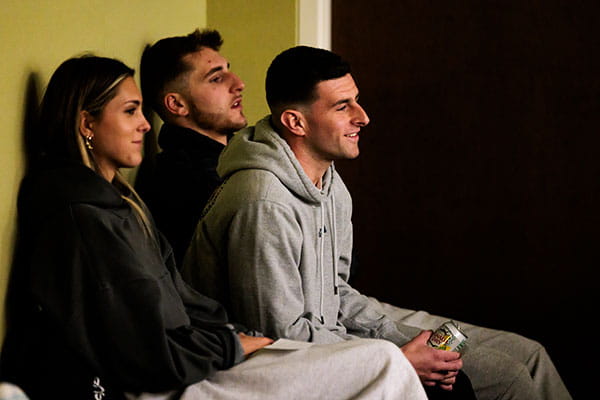The Colin and Erika Angle Center for Entrepreneurship got a special visitor recently—Colin Angle himself.
On November 28, the iRobot founder and CEO stopped by Endicott to talk—what else?—robots, but also Angle’s yearslong and storied journey through failure on his path to success with the creation of the company’s signature Roomba.
“We went six and a half years never starting a month with enough money in the bank to make payroll and we never missed—because we were incredibly honest with ourselves about needing a plan B and a plan C. Because if you can do that, you can find yourselves enough runway to figure it out,” said Angle in a lively talk filled with stories, Star Wars, lots of laughs, a few commercials, and even a cameo from Tina Fey (more on that later).
Angle was introduced by President Steven R. DiSalvo, Ph.D., who said today’s entrepreneurs need foresight to see where the future is headed. In Angle’s case, that meant robots.
From his fraternity house at MIT, Angle said he remembered looking at the clunky Star Wars robots from his youth like R2D2 and C-3P0, and thinking, “Is this the best we can do?”
He continued: “Yes, I was inspired by the idea that robots could make a difference. But it wasn't those guys.”
Instead, it was the Mouse Droid, another Star Wars robot—just a small black box on wheels—that inspired Angle.
“What made this so exciting for me was that I didn’t know how to build R2D2. I don’t know how to build C-3P0. But I knew how to build this,” he said. “You can imagine building a small wheeled robot that looked like a remote-controlled car because that’s what it was and it had enough intelligence to drive around and take you to where you want it to go. That was cool.”
As longtime emblems of the future both in pop culture and in pragmatic everyday life, robots have always been positioned as miracle problem-solvers and do-it-allers that could make life easier. After graduating from MIT, Angle founded iRobot in 1990 with a mission to have fun, make money, deliver great products, and change the world through robotics.
At first, Angle kept his aspirations firmly in the Star Wars realm of his youth and worked with NASA to build Genghis, a robot designed for space exploration.
“Our first business model was to build a robot to go to the moon and sell the movie rights. We were the first companies to fail at this,” said Angle, who wore a shirt that said “Powered by Optimism.”

“The next thing that happened was first, NASA took over that project, shut it down, but took technology from that and added the soldier rover to the MESUR Pathfinder mission in 1997, and my name’s up on Mars. We didn’t make much money, but we survived to fight the next fight of our journey. And everyone working on record said, ‘Well, this is kind of cool. We came up with an idea and look what happened.’”
Despite some fits and starts, Angle told the crowd that iRobot was seven years in before it started generating real revenue and it wasn’t until year eight before it received any venture capital funding.
In 1996, iRobot opened a new chapter when it became a defense contractor with the launch of Ariel, a robot that could detect mines in surf zones. The idea of robots delivering better solutions and services, said Angle, fueled the company to also help after the 9/11 attacks, the Fukushima disaster, and even monitoring oil spills. Using robots to make the world a better place also led to the 2002 deployment of thousands of robots during the war in Afghanistan—and the saving of countless lives.
“One of my main mottos is, ‘If we win, we win,’” Angle said. “Doesn’t matter how hard the problem is, but pick a problem that if you actually succeed, you are creating something worthy. That is going to allow you to move forward and your company to move forward.”
In 2002, iRobot launched the now-eponymous intelligent vacuum that Angle originally wanted to call CyberSuck. But in what he called “a blinding moment of CEO clarity,” the MIT scientist decided that was a bad idea—then begrudgingly agreed to phone in some marketing gurus.
Roomba was born.

The press went wild, and within the first three months, 70,000 units had flown off the shelves.
It wasn’t all rainbows and butterflies, though. After a boom, Roomba soon faced extinction—until Pepsi came along. In a twist of a luck, a commercial for the soft drink featuring an exchange between a Roomba and comic Dave Chappelle created an overnight demand for Roombas again—and Angle and his team learned valuable lessons about creative marketing and advertising, including how to advertise and appeal to consumers altogether.
A short while later, Roomba was parodied on Saturday Night Live by legends Tina Fey and Maya Rudolph—anyone remember the Woomba? (Look it up—and steel yourself.)
“Picture yourself on a Saturday evening, watching television after a week of trying to make a robot company succeed, and seeing this,” said Angle, who pressed play on the clip.
More recently, though, iRobot made headlines when Amazon announced an agreement to acquire the company in the summer of 2022. At long last, true, indisputable success.
“At the end of this journey, I will tell you that the entrepreneurial experience is a lot like building an airplane while you’re flying,” said Angle. “If you’re on the inside of your plane, it kind of looks like unchanging, constant peril. But in fact, it’s not. It’s what winning ultimately feels like in this adventure called service.”


